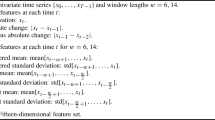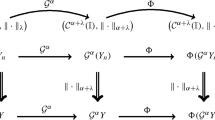Abstract
Recent empirical studies suggest that the volatilities associated with financial time series exhibit short-range correlations. This entails that the volatility process is very rough and its autocorrelation exhibits sharp decay at the origin. Another classic stylistic feature often assumed for the volatility is that it is mean reverting. In this paper it is shown that the price impact of a rapidly mean reverting rough volatility model coincides with that associated with fast mean reverting Markov stochastic volatility models. This reconciles the empirical observation of rough volatility paths with the good fit of the implied volatility surface to models of fast mean reverting Markov volatilities. Moreover, the result conforms with recent numerical results regarding rough stochastic volatility models. It extends the scope of models for which the asymptotic results of fast mean reverting Markov volatilities are valid. The paper concludes with a general discussion of fractional volatility asymptotics and their interrelation. The regimes discussed there include fast and slow volatility factors with strong or small volatility fluctuations and with the limits not commuting in general. The notion of a characteristic term structure exponent is introduced, this exponent governs the implied volatility term structure in the various asymptotic regimes.
Similar content being viewed by others
References
Alòs, E., Yang, Y.: A closed-form option pricing approximation formula for a fractional Heston model. Economics working papers 1446, Department of Economics and Business, Universitat Pompeu Fabra
Bayer, C., Friz, P. K., Gulisashvili, A., Horvath, B., Stemper, B.: Short-time near-the-money skew in rough fractional volatility models. arXiv:1703.05132
Benaim, S., Friz, P., Lee, R.: On BlackĐScholes implied volatility at extreme strikes. In: Cont, R. (ed.) Frontiers in Quantitative Finance, Volatility and Credit Risk Modeling, pp. 19–45. Wiley: Hoboken (2009)
Bennedsen, M.: Rough electricity: a new fractal multi-factor model of electricity spot prices. Working paper. http://ssrn.com/abstract=2636829 (2015)
Bollerslev, T., Osterrieder, D., Sizova, N., Tauchen, G.: Risk and return: long-run relations, fractional cointegration, and return predictability. J Financ Econ 108, 409–424 (2013)
Breidt, F.J., Crato, N., De Lima, P.: The detection and estimation of long-memory in stochastic volatility. J Econ 83, 325–348 (1998)
Charfeddine, L.: True or spurious long memory in volatility: further evidence on the energy futures markets. Energy Policy 71, 76–93 (2014)
Chia, K.C., Bahar, A., Kane, I.L., Ting, C.-M., Rahman, H.A.: Estimation of stochastic volatility with long memory for index prices of FTSE Bursa Malaysia KLCI. AIP Conf Proc 1643, 73 (2015)
Chronopoulou, A., Viens, F.G.: Estimation and pricing under long-memory stochastic volatility. Ann Finance 8, 379–403 (2012)
Comte, F., Renault, E.: Long memory in continuous-time stochastic volatility models. Math Finance 8, 291–323 (1998)
Cont, R.: Empirical properties of asset returns: stylized facts and statistical issues. Quant Finance 1, 1–14 (2001)
Cont, R.: Long range dependence in financial markets. In: Lévy, J., Lutton, E. (eds.) Fractals in Engineering, pp. 159–179: Springer: London (2005)
Engle, R.F., Patton, A.J.: What good is a volatility model? Quant Finance 1, 237–245 (2001)
Fouque, J.-P., Hu, R.: Optimal portfolio under fractional stochastic environment. arXiv:1703.06969 (2017a)
Fouque, J.-P., Hu, R.: Optimal portfolio under fast mean-reverting fractional stochastic environment. arXiv:1706.03139 (2017b)
Fouque, J.-P., Papanicolaou, G., Sircar, K.R.: Derivatives in Financial Markets with Stochastic Volatility: Cambridge University Press: Cambridge (2000)
Fouque, J.-P., Papanicolaou, G., Sircar, K.R., Sølna, K.: Short time scales in S&P500 volatility. J Comput Finance 6, 1–24 (2003)
Fouque, J.-P., Papanicolaou, G., Sircar, K. R., Sølna, K.: Timing the smile. The Wilmott magazine (2004)
Fouque, J.-P., Papanicolaou, G., Sircar, K.R., Sølna, K.: Multiscale Stochastic Volatility for Equity, Interest Rate, and Credit Derivatives: Cambridge University Press: Cambridge (2011)
Fukasawa, M.: Short-time at-the-money skew and rough fractional volatility. Quant Finance 17, 189–198 (2017)
Funahashi, H., Kijima, M.: Does the Hurst index matter for option prices under fractional volatility? Ann Finance 13, 55–74 (2017)
Garnier, J., Sølna, K.: Option pricing under fast-varying long-memory stochastic volatility. Math Finance. arXiv:1604.00105 (2016)
Garnier, J., Sølna, K.: Correction to Black–Scholes formula due to fractional stochastic volatility. SIAM J Financ Math 8, 560–588 (2017)
Gatheral, J., Jaisson, T., Rosenbaum, M.: Volatility is rough. Quant Finance 18, 933–949 (2018)
Gulisashvili, A., Viens, F., Zhang, X.: Small-time asymptotics for Gaussian self-similar stochastic volatility models. arXiv:1505.05256 (2015)
Heston, S.L.: A closed-form solution for options with stochastic volatility with applicantions to bond and currency options. Rev Financ Stud 6, 327–343 (1993)
Jacquier, A., Martini, C., Muguruza, A.: On VIX futures in the rough Bergomi model. arXiv:1701.04260 (2017)
Kalbasi, K., Mountford, T.S., Viens, F.G.: Anderson polymer in a fractional Brownian environment: asymptotic behavior of the partition function. J Theor Probab (2017). https://doi.org/10.1007/s10959-017-0756-2
Livieri, G., Mouti, S., Pallavicini, A., Rosenbaum, M.: Rough volatility: evidence from option prices. IISE Trans. (2018). https://doi.org/10.1080/24725854.2018.1444297
Mandelbrot, B.B., Van Ness, J.W.: Fractional Brownian motions, fractional noises and applications. SIAM Rev 10, 422–437 (1968)
Muravlev, A.A.: Representation of franctional Brownian motion in terms of an infinite-dimensional Ornstein–Uhlenbeck process. Russ Math Surv 66, 439–441 (2011)
Oh, G., Kim, S., Eom, C.: Long-term memory and volatility clustering in high-frequency price changes. Phys A Stat Mech Appl 387, 1247–1254 (2008)
Rypdal, M., Løvsletten, O.: Modeling electricity spot prices using mean-reverting multifractal processes. Phys A 392, 194–207 (2013)
Simonsen, I.: Measuring anti-correlations in the nordic electricity spot market by wavelets. Phys A 233, 597–606 (2002)
Walther, T., Klein, T., Thu, H.P., Piontek, K.: True or spurious long memory in European non-EMU currencies. Res Int Bus Finance 40, 217–230 (2017)
Acknowledgements
This research has been supported in part by Centre Cournot, Fondation Cournot, and Université Paris Saclay (chaire D’Alembert).
Author information
Authors and Affiliations
Corresponding author
Appendices
Technical lemmas
We denote
The martingale \(\psi ^\varepsilon _t\) defined by (33) has the form
Lemma 2
\((\psi _t^\varepsilon )_{t\in [0,T]}\) is a square-integrable martingale and
Proof
See Lemma B.1 in Garnier and Sølna (2016). \(\square \)
The important properties of the random process \(\vartheta ^\varepsilon _{t}\) are stated in the following lemma.
Lemma 3
-
1.
The exists a constant \(K_T\) such that, for any \(t \in [0,T]\), we have almost surely
$$\begin{aligned} \big | \sigma _t^\varepsilon \vartheta ^\varepsilon _{t} \big | \le K_T \varepsilon ^{1/2} . \end{aligned}$$(57) -
2.
For any \(t \in [0,T]\), we have
$$\begin{aligned} \mathbb {E}[ \sigma _t^\varepsilon \vartheta ^\varepsilon _{t} ] = \varepsilon ^{1/2} \overline{D} + \widetilde{D}^\varepsilon _{t}, \end{aligned}$$(58)where \( \overline{D}\) is the deterministic constant (27) and \(\widetilde{D}^\varepsilon _{t}\) is smaller than \(\varepsilon ^{1/2}\):
$$\begin{aligned} \sup _{\varepsilon \in (0,1]} \sup _{t \in [0,T]} \varepsilon ^{-1/2} \big | \widetilde{D}^\varepsilon _{t}\big | < \infty , \end{aligned}$$(59)and
$$\begin{aligned} \forall t \in [0,T),\quad \lim _{\varepsilon \rightarrow 0} \varepsilon ^{-1/2} \big | \widetilde{D}^\varepsilon _{t}\big | =0. \end{aligned}$$(60) -
3.
For any \(0\le t< t' < T\), we have
$$\begin{aligned} \lim _{\varepsilon \rightarrow 0} \varepsilon ^{-1} \big | \mathrm{Cov} \big ( \sigma _t^\varepsilon \vartheta ^\varepsilon _{t},\sigma _{t'}^\varepsilon \vartheta ^\varepsilon _{t'}\big ) \big | =0. \end{aligned}$$(61)
Proof
Using the expression (56) of \(\vartheta ^\varepsilon _t\):
The proof of the first item follows from the fact that \(\mathcal{K}^\varepsilon (t)=\mathcal{K}(t/\varepsilon )/\sqrt{\varepsilon }\), \(\mathcal{K} \in L^1(0,\infty )\).
The expectation of \( \sigma _t^\varepsilon \vartheta ^\varepsilon _{t} \) is equal to
with \(p_C\) defined in Proposition 1.
Therefore the difference
can be bounded by
which gives the second item since \(\mathcal{K} \in L^1(0,\infty )\).
Let us consider \(0 \le t \le t'\le T\). We have
so we can write
and therefore
We can write for any \(\tau >t\):
where \(A^\varepsilon _{t\tau }\) is \(\mathcal{F}_t\) adapted while \(B^\varepsilon _{t\tau }\) is independent from \(\mathcal{F}_t\). Therefore (\(s'\ge t'\ge t\))
where \((\tilde{A}^\varepsilon _{tt'} , \tilde{B}^\varepsilon _{tt'}, \tilde{A}^\varepsilon _{ts'} , \tilde{B}^\varepsilon _{ts'})\) is an independent copy of \(({A}^\varepsilon _{tt'} , {B}^\varepsilon _{tt'}, {A}^\varepsilon _{ts'} , {B}^\varepsilon _{ts'})\). We can then write
where we used Lemma 7 in the last inequality. Then, using the fact that \(\mathcal{K}\in L^1\), this gives
which proves the third item.
Lemma 4
For any smooth function f with bounded derivative, we have
Proof
The conditional distribution of \(Z_t^\varepsilon \) given \(\mathcal{F}_0\) is Gaussian with mean
and variance
Therefore
where p(z) is the pdf of the standard normal distribution. The random variable \(\mathbb {E}\big [ Z_{t}^\varepsilon |\mathcal{F}_0 \big ] \) is Gaussian with mean zero and variance \((\sigma _{t,\infty }^\varepsilon )^2\) so that
which is the desired result.
The random term \(\phi ^\varepsilon _{t}\) defined by (32) has the form
with G defined in (54).
Lemma 5
For any \(t \le T\), \(\phi _{t}^\varepsilon \) is a zero-mean random variable with standard deviation of order \(\varepsilon ^{1-H}\):
Proof
For \(t\in [0,T]\) the second moment of \(\phi _{t}^\varepsilon \) is:
We have by Lemma 4
In view of Lemma 7 we then have
uniformly in \(t \le T\) and \(\varepsilon \in (0,1]\) for some constant \(C_{T}\).
Lemma 6
Let us define for any \(t \in [0,T]\):
as in (41). We have
Proof
Since the expectation \(\mathbb {E}[ G(Z^\varepsilon _0)]=0\), we have
We have moreover
By Lemma 4 we obtain
In view of Lemma 7 we then have
uniformly in \(t \in [0,T]\) and \(\varepsilon \in (0,1]\), which gives the desired result.
Lemma 7
Define
Then there exists \(C>0\) such that
Proof
This follows from \(|\mathcal{K}(s)| \le K s^{H-\frac{3}{2}}\) for \(s \ge 1\) and \(\mathcal{K}\in L^2\).
An alternative model
In Comte and Renault (1998); Funahashi and Kijima (2017) the authors consider a stochastic volatility model that is a kind of fractional Orstein-Uhlenbeck process, but they consider the following representation of the fractional Brownian motion:
where \((W^0_t)_{t \in \mathbb {R}^+}\) is a standard Brownian motion over \(\mathbb {R}^+\). \((W^{H,0}_t)_{t \in \mathbb {R}^+}\) is a zero-mean self-similar Gaussian process, in the sense that \((\alpha ^H W^{H,0}_{t/\alpha })_{t \in \mathbb {R}^+} \) and \((W_t^{H,0})_{t \in \mathbb {R}^+}\) have the same distribution, but it is not stationary, nor does it have stationary increments. Its variance is
while the variance of its increment is (for \(s>0\)):
which has the following behavior
This model is special because time zero plays a special role, and we think it is desirable to deal with the stationary situation addressed in this paper. However, it turns out that the two models give the same result in the fast-varying case. Indeed, the modified fOU process corresponding to (70) is [to be compared with (4)]:
where \(Z_0\) is considered as a constant as in Comte and Renault (1998), Funahashi and Kijima (2017). In terms of the Brownian motion \(W^0_t\) this reads:
where \(\mathcal{K}^\varepsilon \) is defined in (10). It is a Gaussian process with the following covariance (\(t,s\ge 0\)):
that is a function of \(t/\varepsilon \) and \(s/\varepsilon \) with
Note that
with \(\mathcal{C}_Z\) defined by (6). In other words, except for a small period of time just after time 0 which is of duration of the order of \(\varepsilon \), the modified process has the same behavior as the one introduced in this paper. One can then check the detailed calculations carried out in this paper and find that Proposition 1 still holds true with the modified model \(Z^{\varepsilon ,0}_t\).
Rights and permissions
About this article
Cite this article
Garnier, J., Sølna, K. Option pricing under fast-varying and rough stochastic volatility. Ann Finance 14, 489–516 (2018). https://doi.org/10.1007/s10436-018-0325-4
Received:
Accepted:
Published:
Issue Date:
DOI: https://doi.org/10.1007/s10436-018-0325-4
Keywords
- Stochastic volatility
- Short-range correlation
- Fractional Ornstein–Uhlenbeck process
- Hurst exponent
- Mean reversion




